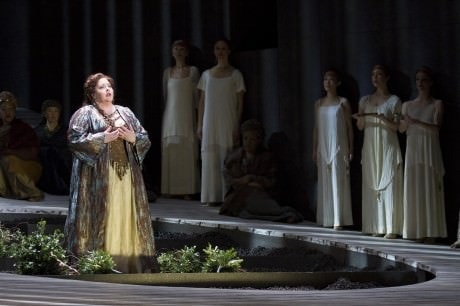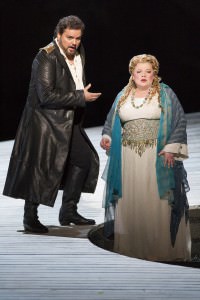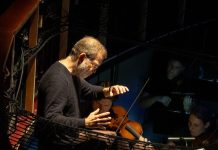Washington National Opera mounts a dazzling production of Bellini’s Norma. American soprano Angela Meade makes her debut with WNO. Norma is the role of a lifetime; the Everest of female opera roles, and to witness this launch of such a powerhouse talent is a once-in-a-lifetime opportunity. That every other element of the production is superb is icing on the cake.

The story of Norma has been told since the dawn of time; Norma’s husband has an affair with a younger woman and, shockingly, they find out about each other. The man sings, “I was fated to love you and fated to leave her!” Unsurprisingly, the two women aren’t buying it. In Bellini’s story, Norma is a druid priestess in Gaul and Pollione is a Roman proconsul. The fact that their love is as forbidden – as his affair – adds urgency to their conflict. That theme of the feminine druids and masculine Romans is echoed throughout the opera – thematically, musically, and in the set and costumes as well.
Vincenzo Bellini wrote Norma in 1831 with his longtime librettist Felice Romani. It was a magic partnership. While Bellini was a ridiculously talented composer, he was first and foremost a storyteller and unlike so many operas, the story in this one is intimate and as powerful as the music. It is never sacrificed for one big number or star. Every note and every musical run comes in service of that story and the themes Bellini wanted to explore, which makes them doubly powerful. Woodwinds play throughout the druidic passages before trumpets take over when the Romans arrive. This may be the quintessential Bel Canto opera. Bel Canto means beautiful singing, but has come to imply that magic chemistry between complicated, challenging vocals and powerful emotion and Norma delivers both.
The night belongs to Angela Meade. She has been tearing up the award and festival circuit in the opera world, winning the prestigious Metropolitan Opera National Council Auditions in 2007, which was highlighted in the documentary The Audition. She commands the stage in every scene with a larger-than-life presence and nuanced acting. Her voice floats over the impossibly high runs and shakes The Kennedy Center’s Opera House in the major emotional moments. Her first aria is one of the most recognizable and beautiful pieces in Italian opera, “Casta Diva.” I was sitting in my seat trying to come up with something coherent to describe the feeling in the theater at that moment and at so many others over the night, but all my brain could give me was, “Whoa!”
Dmitry Belosselskiy (Oroveso) begins the opera in a mature, powerful bass that is as clear as a bell even from the back of the stage. Rafael Davila (Pollione) sings in a resonant tenor and also excels in this difficult acting role as the slimy guy who would abandon his wife for a younger model, and yet still retain our respect as someone that Norma could ever love in the first place. He walks that line perfectly. Mezzo-soprano Dolora Zajick (Adalgisa), Norma’s friend and unwitting rival, has a mellowed and full-body tone that nevertheless can fill the stage when needed and complements Meade well on their many emotionally and musically challenging duets like “Sola, furtiva al tempio.” One of the highlights of the night is hearing them sing together when the orchestra falls silent. Mauricio Miranda (Flavio) and Julia Mintzer (Clotilde) do a great job at the final two roles. They are members of the Domingo-Cafritz Young Artist Program. This will not be the last we hear of them both.
The orchestra is smooth, polished, and gorgeous under the singers and under the direction of Italian phenom Daniele Rustioni who at 29 seems to believe he can conjure an opera on the force of his baton alone – and he can. The chorus is large, over fifty people onstage, with a very impressive sound. Choreographer Barney O’Hanlon has created stately dances for a troupe of druid priestesses that bring life and movement to the ritual.
Director Anne Bogart also makes her WNO debut. She is very skilled at arranging tableaus onstage like for “Casta Diva,” where she arranges the chorus around a central pit where Norma stands so that everything is focused on her. She is also skilled at building the tension in the more intimate moments in Norma’s home.
The set design by Neil Patel continues the theme of feminine and masculine, druid and Roman, with one side of the stage taken up by a tall, rough, white fence propped up with long beams that many actors weave between. The right side is a black, equally tall, fortress with different sized windows and exits. The stage slopes up from the pit to a post-modern painted backdrop of a hole in the sky that seems to conjure up the ancient times (50 BCE) where the play is set. A large hole in that slope serves both as the priestess’s ceremonial pit and Norma’s home where she’s hiding her children.
The true genius of the set comes in the way it supports the lighting design by Christopher Akerlind. Like everything else in this production, there is an amazing level of coherence between artists. The druid’s wooden wall casts dramatic vertical shadows across the stage, whereas the square windows of the Romans make an entirely different effect. The overall lighting keeps to that clean white look of the set, which works well since the opera opens with Oroveso commenting on how the moon has turned everything silver.
The costumes by James Schuette continue in that subdued white palate that creates a very pleasing overall picture on this large stage and yet does not sacrifice the individual details of furs, robes, Roman armour, jewelry, and scarves make the chorus into characters in their own right. The druid priestesses are decked in beautiful, flowing white costumes that again work well in tableau and on an individual level. Schuette outfits Norma in a variegated colored robe that stands out on the whitened stage.

This production of Norma by Washington National Opera is that very, very rare experience where every element is superior – from the score, to the story, to the stars, the singing, acting, orchestra, and dancing. Everyone over-delivers and surprises. This is a magical, magnificent night at the opera, not to be missed.
Running Time: Three hours, with a 20-minute intermission.
Norma plays through March 24, 2013 at The Kennedy Center’s Opera House – 2700 F St. NW, inn Washington, DC. For tickets, call the box office at (202) 467- 4600, or purchase them online.




